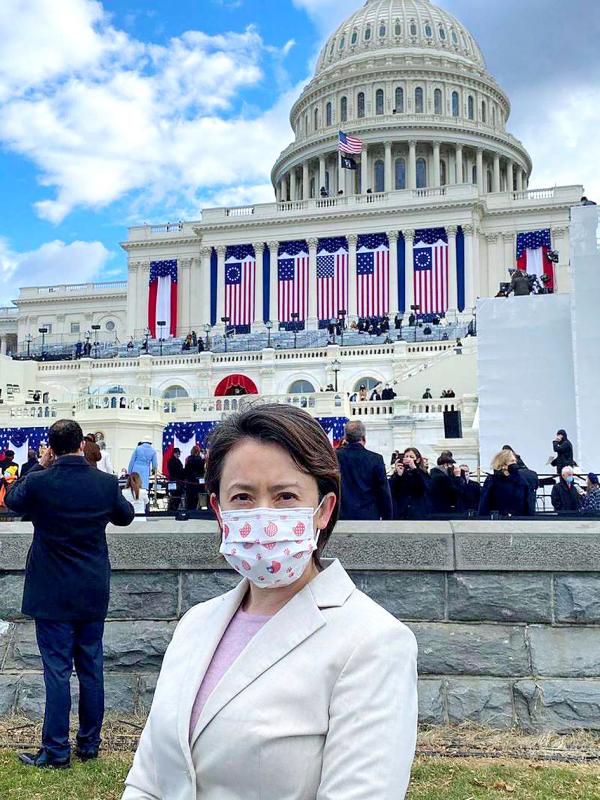President Tsai Ing-wen (蔡英文) yesterday congratulated US President Joe Biden and US Vice President Kamala Harris on their inauguration, and reiterated the nation’s commitment to advancing ties with its “most important ally,” after the Taiwanese envoy in Washington was formally invited to the ceremony, the first since the two sides severed ties in 1979.
“Taiwan and the US have long had diverse and close cooperation on all manner of issues,” Tsai wrote on Facebook, lauding the “warm and deep friendship” between the people of the two nations.
She wished the new administration well in carrying out its policies, and vowed to deepen the Taiwan-US relationship to “contribute the positive forces of democracy and freedom” to the world.

Photo courtesy of the Taipei Economic and Cultural Representative Office in the US
The president also thanked the administration of former US president Donald Trump, including its diplomats, as well as bipartisan supporters for a fruitful four years.
The warming ties were fully evidenced by the formal invitation offered to Representative to the US Hsiao Bi-khim (蕭美琴) to attend the inauguration on Wednesday, Tsai said.
The US Joint Congressional Committee on Inaugural Ceremonies, in a break from tradition, formally invited Taiwan’s representative to attend for the first time since 1979.
In previous inaugurations, Taiwanese representatives have been invited as guests of US congressional members or organizations.
The Ministry of Foreign Affairs in a news release yesterday confirmed the nature of the invitation to the “most important democratic event in the US.”
The gesture “demonstrates the two nations’ close friendship formed on the basis of shared values,” it said. “On this existing foundation, we will continue to promote exchanges and cooperation on all levels and in all areas with the Biden administration.”
Ministry spokeswoman Joanne Ou (歐江安) said that Hsiao was invited in the same capacity as other honored guests, including permission to bring a plus-one.
It was not the only time Taiwanese officials have attended, Ou said, but stressed the “great significance” of this invitation, especially as the event was pared down amid the COVID-19 pandemic.
Asked why the ministry did not announce the invitation earlier, Ou said that the ministry had no ulterior motives.
Based on experience, it is ministry policy not to publicize such invitations in advance, Ou said.
The ministry prefers to first use the “most appropriate method” to offer congratulations, she said.
A ministry statement saying that the “probability [of attending the inauguration] is low” referenced sending a delegation to Washington, she said, adding that it said nothing about Hsiao.
“Anyone who says there is ‘no way in’ is making an incorrect assumption,” she said, referencing Chinese Nationalist Party (KMT) Legislator Ma Wen-chun’s (馬文君) statement on Wednesday that the Tsai administration’s deference to the US Republican Party had harmed its future with the Biden administration.
The KMT is positive about advances in Taiwan-US ties, KMT Chairman Johnny Chiang (江啟臣) said, but added that it is more important to convert formal exchanges into tangible mutual benefits.
Additional reporting by CNA

A magnitude 7.0 earthquake struck off Yilan at 11:05pm yesterday, the Central Weather Administration (CWA) said. The epicenter was located at sea, about 32.3km east of Yilan County Hall, at a depth of 72.8km, CWA data showed There were no immediate reports of damage. The intensity of the quake, which gauges the actual effect of a seismic event, measured 4 in Yilan County area on Taiwan’s seven-tier intensity scale, the data showed. It measured 4 in other parts of eastern, northern and central Taiwan as well as Tainan, and 3 in Kaohsiung and Pingtung County, and 2 in Lienchiang and Penghu counties and 1

FOREIGN INTERFERENCE: Beijing would likely intensify public opinion warfare in next year’s local elections to prevent Lai from getting re-elected, the ‘Yomiuri Shimbun’ said Internal documents from a Chinese artificial intelligence (AI) company indicated that China has been using the technology to intervene in foreign elections, including propaganda targeting Taiwan’s local elections next year and presidential elections in 2028, a Japanese newspaper reported yesterday. The Institute of National Security of Vanderbilt University obtained nearly 400 pages of documents from GoLaxy, a company with ties to the Chinese government, and found evidence that it had apparently deployed sophisticated, AI-driven propaganda campaigns in Hong Kong and Taiwan to shape public opinion, the Yomiuri Shimbun reported. GoLaxy provides insights, situation analysis and public opinion-shaping technology by conducting network surveillance

‘POLITICAL GAME’: DPP lawmakers said the motion would not meet the legislative threshold needed, and accused the KMT and the TPP of trivializing the Constitution The Legislative Yuan yesterday approved a motion to initiate impeachment proceedings against President William Lai (賴清德), saying he had undermined Taiwan’s constitutional order and democracy. The motion was approved 61-50 by lawmakers from the main opposition Chinese Nationalist Party (KMT) and the smaller Taiwan People’s Party (TPP), who together hold a legislative majority. Under the motion, a roll call vote for impeachment would be held on May 19 next year, after various hearings are held and Lai is given the chance to defend himself. The move came after Lai on Monday last week did not promulgate an amendment passed by the legislature that

AFTERMATH: The Taipei City Government said it received 39 minor incident reports including gas leaks, water leaks and outages, and a damaged traffic signal A magnitude 7.0 earthquake struck off Taiwan’s northeastern coast late on Saturday, producing only two major aftershocks as of yesterday noon, the Central Weather Administration (CWA) said. The limited aftershocks contrast with last year’s major earthquake in Hualien County, as Saturday’s earthquake occurred at a greater depth in a subduction zone. Saturday’s earthquake struck at 11:05pm, with its hypocenter about 32.3km east of Yilan County Hall, at a depth of 72.8km. Shaking was felt in 17 administrative regions north of Tainan and in eastern Taiwan, reaching intensity level 4 on Taiwan’s seven-tier seismic scale, the CWA said. In Hualien, the